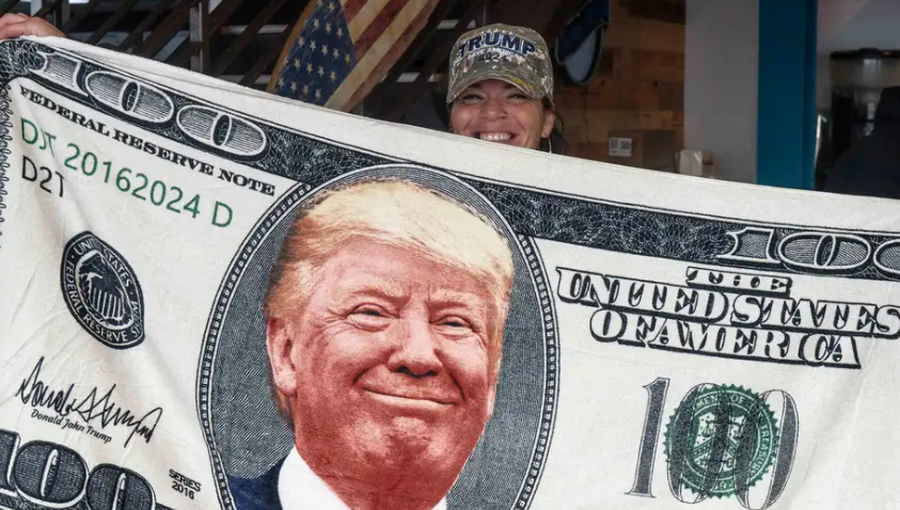
US President Trump is causing a sell-off in the dollar with his unpredictable tariff policy - is the end of the world's reserve currency approaching? This could have dramatic consequences.
Who is the biggest loser from the US tariff policy in financial markets? If you ask currency experts, the answer is clear: the dollar. Unlike stock markets, which have managed to recover a good part of their losses, there are so far no signs of a similar recovery for the US currency.
Euro at highest level in the last three years
US President Donald Trump's recent announcement of new tariffs has sparked a massive sell-off in the dollar. Investors have turned to the euro, yen and Swiss franc. This is a dramatic development unprecedented in stock market history.
Thus, in just a few days, the value of the euro increased by a full six cents against the dollar. At certain points, the euro is worth over $1.14, which is the highest level in the last three years. The dollar index, which shows the value of the American currency compared to six other major currencies, fell into double digits for the first time since 2022. So far, there has been no serious countermeasure.
More rate cuts due to recession risk?
Behind this lies investor fear of the consequences of Trump's unpredictable tariff policy. The market now assesses the growth risks to the US economy as greater than inflationary risks. Experts believe that the risk of the US entering a recession due to higher import tariffs has increased dramatically.
The US Federal Reserve appears to be responding to this scenario by frequently cutting interest rates. Traders now expect four rate cuts, which could fall as low as 1.0 percent, in the next 12 months. By comparison: before "Liberation Day," as Trump called it when he raised all tariffs, the market had only expected three interest rate cuts from the Fed.
Trump has destroyed trust
The dollar's status is rapidly eroding. The market is beginning to question the dollar's role as the world's reserve currency. The recently announced exemptions for cell phones and laptops as well as cars do not change this, as companies still have no certainty in their plans. How long can the "temporary" exemptions last? It all depends on US President Trump's next move.
It's clear that there is now a degree of familiarity with Trump, says Antje Praefcke, a foreign exchange expert at Commerzbank. "But the damage has been done, the trust has been destroyed."
As long as this uncertainty lasts, as she explained, for everyone involved in world and economic events, a significant recovery of the dollar can hardly be expected.
Why does Trump want to weaken the dollar?
But it's likely that Trump himself views the sale of the US currency positively, since weakening the dollar as the world's reserve currency is one of the stated goals of his tariff policy. The logic behind this: a weaker domestic currency reduces the gigantic national debt and also the US trade deficit.
At the same time, the current depreciation of the dollar is more of a "planned" side effect of the US tariff policy by Trump and his advisers. That is, the aim is to force US creditors to carry out a coordinated depreciation of the dollar in the coming days and weeks and thus make US exports more competitive. "Mar-a-Lago deal" is the key word.
"Agreement" to devalue the dollar?
Behind this lies the idea of Stephen Miran, the new chairman of the US President's Council of Economic Advisers: Based on the 1985 "Plaza Accords", foreign creditors should convert their US government bonds into bonds with an extremely long 100-year term and low or no interest.
A trade that no country would willingly accept - unless threatened with high tariffs or the removal of military protection from the US.
Trump and Miran are playing with fire
Experts are convinced: Mirani and Trump are playing with fire. LBBW chief economist Moritz Kremer speaks of "an extremely dangerous idea." For him, there is no surer way to undermine confidence in the dollar.
"In all financial crises, US government stocks have been a safe haven. This Mar-a-Lago deal would undermine that haven," Kraemer warns. "The result would be a financial crisis of global proportions."
US refinancing at risk
In fact, removing the dollar as the world's reserve currency would have dramatic consequences for the United States itself. The demand for dollars would no longer be as great, while demand for U.S. government bonds would fall sharply. Incomes would rise accordingly.
Therefore, the simple refinancing of US government debt in financial markets as before would be on the verge of being suspended. The US government would no longer be able to borrow unlimited amounts of money – even though it urgently needs to, because the US is, in absolute terms, the country with the largest debt in the world, at almost $37 trillion.
The dollar's decline would directly affect American companies and consumers, and therefore Trump voters. They would have to accept huge losses and thus face the consequences of their president's confusing economic policies. Goldman Sachs economists assume that even tax rate cuts would not be able to compensate for this.
Trump advisor surprised by stock market decline
Have Miran and Trump thought about this? In fact, the economic-political concept of the American government has so far proven to be extremely short-sighted and ill-conceived in many segments. Many of Miran's expectations have not been realized.
For example, Trump's adviser predicted in a document written in November 2024 that there would be almost no turbulence in stock markets after the announcement of US tariffs. The reality, as we all know, was completely different./ DW (A2 Televizion)











